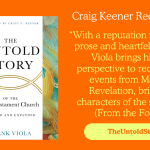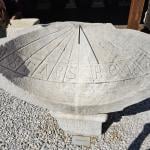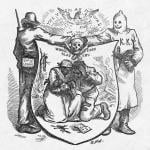Many conservatives today are debating or trying to reconcile their traditional commitment to free markets with President Trump’s protectionism and tariffs. In the course of his defense of free market economics, Dominic Pino quotes some passages from Adam Smith, the original theorist of capitalism, that shed some interesting light on vocation.
Today I’d like to discuss not so much the protectionism vs. free market debate, but the connection between vocation and the key economic principle of the division of labor. I’ll let Pino give you the passage from The Wealth of Nations:
In almost every other race of animals each individual, when it is grown up to maturity, is entirely independent, and in its natural state has occasion for the assistance of no other living creature. . . .But man has almost constant occasion for the help of his brethren.
Let that sink in. Most animals are self-sufficient. Even when they live in packs, flocks, or herds, their actions are not much different from each other. Yes, in the insect world, bees and ants have sort of a division of labor, but nothing on the scale that humans do.
The point is, human beings need each other. They (we) exist in groups–the three estates again–in which we are mutually dependent on each other. The result is a kind of unity with others, but at the same time we retain our individuality in the things we do for each other.
We don’t have to make the clothes we wear or build the house we live in. Other people, more skilled at those arts than we are, can do such things for us. In exchange, we give them the value of what we are good at–teaching or farming or managing or preaching.
Economists call this mutual interdependence the division of labor. Theologians call this the doctrine of vocation.
We Americans with our frontier heritage prize self-reliance. Ideally, we would make our own clothes and build our own houses. For those with those kinds of aptitudes, good for them! They are especially gifted, though they too are usually still dependent on other people who grew the cotton, manufactured the textiles, chopped down the trees, mined the metals, and shipped it all to them.
Sometimes, though, the ideal of self-reliance comes with an attitude: We don’t want to be dependent on anybody. And yet we are: dependent on God above all, but also on other people, who are also dependent on us. “It is not good for man to be alone,” so God created us to live in families, the state, and the church.
To lift something else from Pino out of its context of economic controversy, he points out a curious phenomenon (my emphasis):
Countries where people don’t specialize and trade — countries where people grow their own food, make their own clothes, build their own houses — are the world’s poorest. The country that elevated self-sufficiency to a foundational national principle and has almost completely isolated itself from international trade — North Korea, with its Juche ideology — is a communist police state.
In vocation, God calls us to different tasks and relationships in the church, the family, and the state. Those latter two are where Luther locates economic activity, what we do to make a living for our family (the word “economy” meaning originally the management of the household) and contribute to the society where God has placed us.
In these estates, in these mutually dependent relationships that only human beings have, we live our lives and our faith in love and service to our neighbors.
Now here is where vocation differs somewhat from Adam Smith. Pino goes on with our first quotation, above:
“But man has almost constant occasion for the help of his brethren, and it is in vain for him to expect it from their benevolence only,” Smith wrote. “He will be more likely to prevail if he can interest their self-love in his favour, and shew them that it is for their own advantage to do for him what he requires of them.”
Vocation is driven by love of neighbor. Capitalism is driven by self-love.
Yet Smith is surely right that we can’t necessarily expect our brethren’s help from their benevolence only. And in God’s design, carpenters won’t build our houses for nothing. Nor should they. As Jesus Himself says, “the laborer deserves his wages” (Luke 10:7).
This world, fallen as it is, must be ruled by law to constrain our sinful tendencies. We would take advantage of carpenters if they built our houses for free. We must give them something from our labor of equal value. We need a medium of exchange–money–to ensure that the exchange is equivalent, and we need a rule of law to ensure that our exchange is fair, not breaking the commandment against stealing.
The economy channels our self-love so that it is outer directed, so that we help others, even despite our own selfish tendencies.
A key text for vocation is “You shall love your neighbor as yourself” (Mark 10:31). This means that we are to love ourselves. But that doesn’t have to contradict our love for our neighbor. In fact, in the economy, we love our neighbor as the result of loving ourselves.
Thus, God compels even sinners to help each other. A non-Christian and a Christian may do the very same work. But that work may have different motivations and different meanings. A non-Christian might do the work solely out of self-interest–a desire for money, ambition, or just the personal pleasure of doing the work–whereas a Christian, who may also desire money, be ambitious, and take pleasure in the work, also has the additional dimension of loving and serving his neighbor for Christ’s sake.













